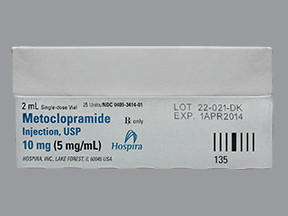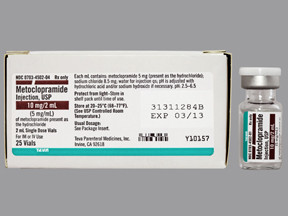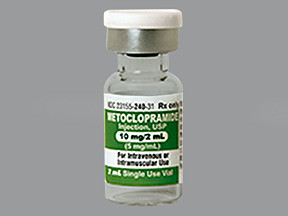METOCLOPRAMIDE - INJECTION
PHONETIC PRONUNCIATION: (MET-oh-KLOE-pra-mide)
COMMON BRAND NAME(S): Reglan
GENERIC NAME(S): metoclopramide HCl
Uses
USES: Metoclopramide is used to prevent nausea and vomiting from surgery or chemotherapy. It is also used by people with diabetes who have slow emptying of their stomachs (gastroparesis). Treating gastroparesis can decrease symptoms of nausea, vomiting, and stomach/abdominal fullness. Metoclopramide may also be used in certain procedures where stomach emptying is needed. Metoclopramide works by blocking a natural substance (dopamine) which can cause nausea and vomiting. It also speeds up stomach emptying and movement of the upper intestines. This drug is not recommended for use in children younger than 1 year due to an increased risk of serious side effects (such as muscle spasms/uncontrolled muscle movements). Ask the doctor or pharmacist for details.
How to use METOCLOPRAMIDE - INJECTION
HOW TO USE: See also Warning section. Read the Medication Guide provided by your pharmacist before you start using metoclopramide and each time you get a refill. If you have any questions, ask your doctor or pharmacist. This medication is given by injection into a muscle or vein by a health care professional. The dosage is based on your medical condition, response to treatment, age, weight and other medications you may be taking. Be sure to tell your doctor and pharmacist about all the products you use (including prescription drugs, nonprescription drugs, and herbal products). If this medication has been used regularly for a long time or in high doses, withdrawal symptoms (such as dizziness, nervousness, headaches) may occur if you suddenly stop using this medication. To prevent withdrawal reactions, your doctor may reduce your dose gradually. Consult your doctor or pharmacist for more details, and report any withdrawal reactions right away. Tell your doctor right away if your condition lasts or gets worse.
Side Effects
Precautions
Interactions
Overdose
Images
Reviews
Warning
WARNING: This medication may cause a serious movement disorder called tardive dyskinesia. In some cases, this condition may be permanent. The risk of tardive dyskinesia is increased with the longer use of the medication and the more medication that you receive. The risk is also increased in older adults (especially women) and in people with diabetes. Do not use metoclopramide for longer than 12 weeks. Talk to your doctor about the risks and benefits of this medication. Tell your doctor right away if you develop any unusual uncontrolled movements (especially of the face, mouth, tongue, arms or legs). There is no treatment for tardive dyskinesia, but in some cases the symptoms may lessen or stop once metoclopramide is stopped.
Disclaimer
IMPORTANT: HOW TO USE THIS INFORMATION: This is a summary and does NOT have all possible information about this product. This information does not assure that this product is safe, effective, or appropriate for you. This information is not individual medical advice and does not substitute for the advice of your health care professional. Always ask your health care professional for complete information about this product and your specific health needs.





No Reviews Yet